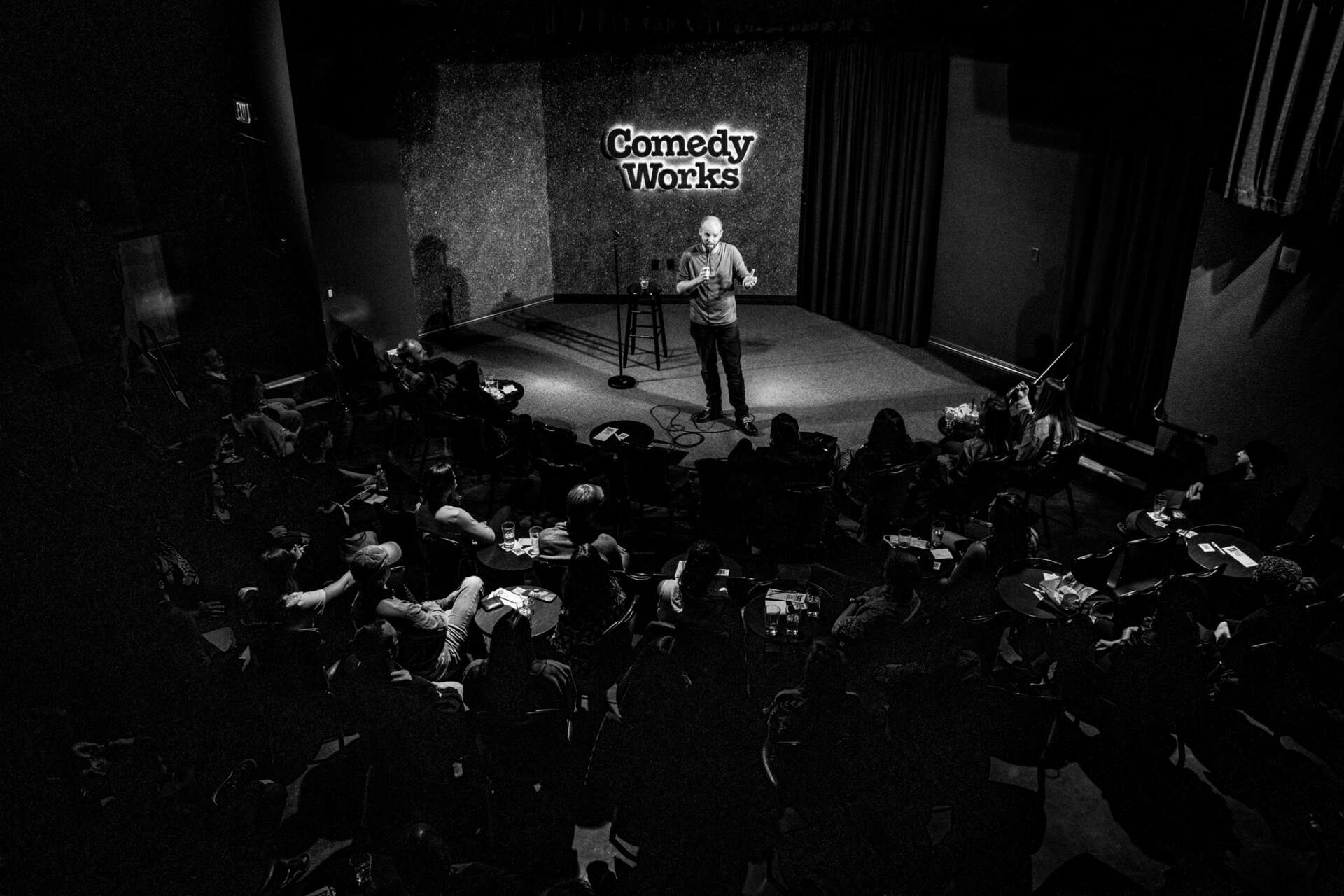Alright – so today we’ve got the honor of introducing you to Alan Bromwell. We think you’ll enjoy our conversation, we’ve shared it below.
Alan, thanks for taking the time to share your stories with us today Can you tell us about a time that your work has been misunderstood? Why do you think it happened and did any interesting insights emerge from the experience?
One of the main things a comedian wants is to be understood. But I’m at the point where I’ve conceded that I’m only beginning to understand myself, and I can’t expect anyone else to figure it out for me.
Many times in my career as a comedian I’ve been mislabeled, misrepresented, and even ostracized, and it took me some time to realize that these apparent roadblocks were my own creation. When I began in comedy, I got labeled a “drug freak” because a lot of what I was saying on stage had to do with psychedelics. I found it funny that people could see me this way when I was living a more or less ascetic life. But I realized eventually that I was using the “stoner” or “hippie” perspective as a type of mask to explain some of my ideas. I didn’t want to take full ownership of what I was saying or where the ideas were coming from, so I created the persona as a way of protecting myself. As soon as I got clear that the source was not so much the mushroom but my own intuition, the gossip faded away.
Later on I got maligned as a “womanizer” and I know now that the cause was separation from my creative process. I was bored of doing the same rooms over and over again, and I began to seek gratification off-stage as a way of compensating for the lack of fulfillment I was feeling on-stage. I got very fixated on the injustice of being lied about, knowing full well in my heart I was treating the people in my life with love. But this indignance was just one more layer of distraction from my work.
The fact of the matter is, you get to write your own story, but everyone else gets to write theirs, too. They can paint you as a villain or a hero, or anywhere in between. And it doesn’t matter if they are projecting, because everyone is. Anyone whose character I’ve judged, it’s just a reflection of me. The trap is when you allow yourself to identify with how someone else sees you.
The temptation is to fight against mischaracterization. The sobering lesson I learned is, pushing against a spring only creates more tension. I spent years trying to defeat what had nothing to do with me. And of course I couldn’t. I was so appalled to see people eagerly tearing me down to cover up their own unfulfillment. But in the end it was all a reflection of my unfulfillment.
There will always be critics. Probably the higher you soar the more insecurities you’ll trigger. But the trick is to see these reactions as fundamentally neutral. You don’t need to armor against them. Nobody, no matter how bitter, no matter how manipulative, can destroy what you create. Only you can.
I know now, I’m not misunderstood. The world understands me as well as I do.


Awesome – so before we get into the rest of our questions, can you briefly introduce yourself to our readers.
I’m an engineer-turned-comedian. Five years down the path of a code monkey, my life riddled with comedic disaster, I decided to take to the stage. And I’ve never looked back.
I perform at the Denver Comedy Works and headline shows across the country. My stand-up is on comedy radio, iTunes, and YouTube. I’m a contributor to Rooster Magazine, and I am hosting and producing a new web series called Backstage, where you’ll get to see the way comics really talk to each other behind the curtain.


What’s a lesson you had to unlearn and what’s the backstory?
As any novice would, I listened to the elder comedians when I began performing. They seemed to have it figured out. In hindsight, they really didn’t. I know now that everyone’s on their own path and the only real advice is to follow your heart. But back then I was hungry for technique and took whatever advice I could get.
One of the main things they told me was to “get on stage as much as possible”. In fact, what was touted was that stage time was the only real factor in determining who’s getting better. Humorously—or tragically, depending on your view of humanity—I watched some open-micers literally drive themselves to insanity following this prescription to no avail.
What will no doubt infuriate those who follow this view of the world is: some people succeed with ease, and many fail despite painstaking exertion. Many of those who succeed are not as talented as those toiling beneath them.
There are two objectives I can speak to. One is improving at comedy. The other is succeeding in the business. In the case of the former, stage time is a factor, but it’s really about quality over quantity. Running the same tired jokes to basements of jaded amateurs (who lack both emotional and social intelligence) is no recipe for improvement. What makes them laugh often won’t translate to real crowds, and I’ve watched these cretins sneer at comedic gold.
You need to be performing for actual people, not comics. These rooms exist. Find them and cherish them. The other thing is that you need to be spending serious time thinking, writing, and rehashing ideas. For me, this is probably more important that stage time. Some people may work differently. But for me, getting back on stage without developing the ideas with myself first is relatively fruitless.
Is there something you think non-creatives will struggle to understand about your journey as a creative? Maybe you can provide some insight – you never know who might benefit from the enlightenment.
There are no non-creatives. This is the thing that’s hard to understand when you’ve been conditioned by so many “experts” and “teachers” to believe that creativity is something rare and specialized. In fact, we are all engaged in creativity constantly. The only question is: are you creating your life consciously or unconsciously? Even the most hard-nosed materialist must concede that what we experience psychologically is a creation based on our expectations and definitions. Every event is perceived differently by each individual perceiving it. What accounts for the difference is what psychologists call “bias”, what lawyers call “eyewitness unreliability”, and what I call creativity. I mean this literally: we all create our lives.
So in the realms of art, we get to peer into the mind of the creator. A painting shows us the vision of the painter. A great comedian takes you into her head. A novelist tells you the story how he saw it. I’m not a dancer, but I can feel what dancers are saying with their bodies. Likewise, even if you consider yourself a “non-creative”, you can sense the emotion conveyed by the art you enjoy.
The creative path begins with the recognition that as easily as you can receive, you can create (and moreover, that it’s your purpose). All children create spontaneously. It’s only because of how we socialize them that many of them stop. It’s not important to define what counts as art. It’s not important to divide creations into “good” and “bad”. All that matters is that you pursue the creation that excites you. Otherwise you are creating on behalf of someone else.
My journey has been remembering this truth over and over again. That I create for me, because it’s fun. Not to make a living. Not to impress anyone. Because to live any other way is just survival.
Contact Info:
- Website: https://alanbromwell.com/
- Instagram: @alan.bromwell
- Twitter: @alanbromwell
- Youtube: https://www.youtube.com/@AlanBromwell
Image Credits
Jeff Stonic


